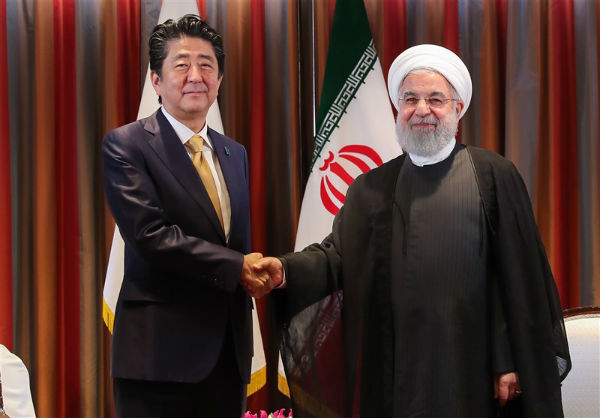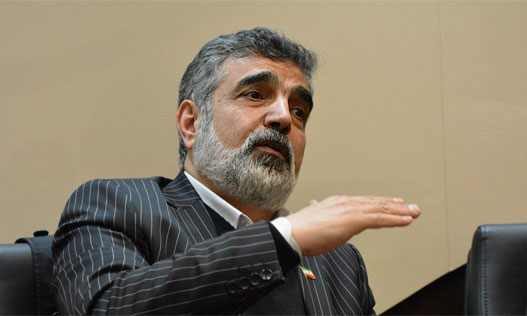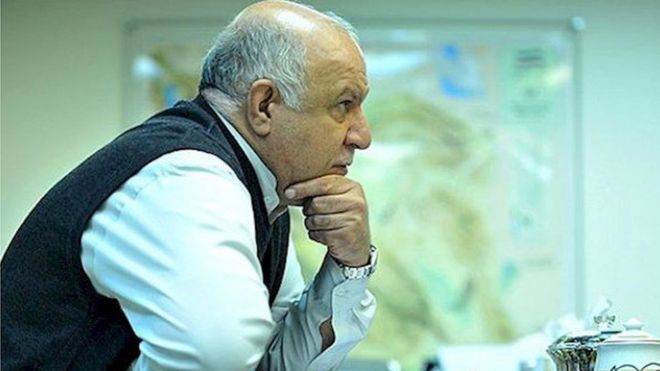
The necessity of basic changes in regional and domestic policies
The editorial of Arman Emrooz deals with the consequences of Iran pulling out of the nuclear deal, which requires changes to be made in regional and domestic policies.
What is happening in the Gulf and the Sea of Oman doesn’t require any decisive documents to prove that Iran is guilty. Even though Britain, France, and Germany have not confirmed that Iran has attacked the oil tankers in the Sea of Oman, the Americans are after changing Iran’s issue to a global one. They are after creating a global consensus against Iran, hence satisfying public opinion in America.
The American people do not want to get involved in another war, and the international atmosphere wouldn’t warrant such a thing either. The U.S. main goal, therefore, is to put economic, political, and military pressures on Iran, thus isolating it from the international community.
The remarks of the Iranian Nuclear Agency spokesperson and President Rouhani mean Iran has entered special circumstances. The White House, France, Germany, and Britain have shown negative reactions to Iran’s new approach. Perhaps, Iran hopes that Russia and China will stand by Iran under any circumstance. However, if eventually, Iran pulls out of the nuclear deal, its ties with the world will be cut off, i.e. it will lose the European Union and all possible hopes.
Even though Articles 26 and 36 of the JCPOA stipulate that if any country doesn’t abide by its obligations, the other country can take certain measures, we should take the circumstances into account. Can Iran take steps in producing more enriched uranium and heavy water than its quota in the JCPOA? Will the international community and the European Union increase their pressures on Iran?
With the German Foreign Minister acknowledging they couldn’t do miracles, INSTEX stopped being implemented. Germany is in charge of implementing INSTEX, and with the German Foreign Minister’s trip to Tehran, none of the expectations were met.
Arman Emrooz – June 19
Efforts to preserve Europe’s support for Iran in the JCPOA
The editorial of Setareh Sobh focuses on why Iran’s measures in reducing its obligations in the nuclear deal (JCPOA) might push European signatories of the deal to the U.S. side.
The Iranian Atomic Energy Spokesperson Behrooz Kamalvandi unveiled the second step in reducing Iran’s nuclear obligations within the nuclear deal. So far, the step has faced reaction by the European signatories of the deal and U.S. negative propaganda but it has not had many consequences for Iran.
What Kamalvandi said, however, is different from the first step to decrease Iran’s obligations in the nuclear deal within Articles 26 and 36. In the second step, production of enriched uranium will surpass 300kg and the amount of Arak’s heavy water too will increase to more than 130 tons. Also, Kamalvandi said that different scenarios have been taken into account for going beyond 3.67% enrichment, which might increase up to 20%.
These steps might convey the idea that Iran has pulled out of the JCPOA. Even though Iranian officials say Iran is acting within the framework of Articles 26 and 36, surpassing the nuclear obligations means something else for the other parties to the deal. For example, the IAEA Director General Yukiya Amano, in the agency’s latest report, talked of Iran’s commitment to its nuclear obligations with doubt. This can be a sign for Iran.
Given the circumstances in the region, taking such steps might mean to the Europeans that Iran intends to exit the JCPOA, which might benefit America. This might lead to Europe distancing itself from Iran. This is what Donald Trump needs, as he is seeking to make Iran an international issue.
Iranian officials must know that any actions taken to retaliate against U.S. measures might be interpreted differently on the international level. If Europe is distanced from Iran and gets closer to America, and then the signatories to the JCPOA might demand the return of Iran’s case to the UN Security Council.
Setareh Sobh – June 18
Empty houses, empty hands
The editorial of Ettellat focuses on the common practice in Iran’s economic market: buying houses and keeping them empty, which is considered by many as a safe way for investing their money.
With the beginning of the summer, the problem of housing – particularly in big cities and Tehran – takes on new dimensions. As a result of a 100% plus increase in the average price of residential apartments in Tehran, house purchases have reached the lowest possible level in the early months of the year, and the number of transactions in the last three months had a 60% drop in Tehran and a 30% drop in the entire country. Nevertheless, the housing market still resists decreasing prices.
This resistance, however, is not because of a shortage of housing or a lack of supply and demand. According to experts and officials, more than 500,000 houses in Tehran and 2.5 million houses in the entire country are empty. Also, the estimates show that the number of existing houses in the country are more than the number of Iranian households. There are more than 25,410,000 residential houses in the entire country.
More than 2.5 million residential houses are empty. The unprofitability of these empty houses amounts to almost $100 billion, which is frozen in the country’s economy and no one benefits from it. The reason is obvious: keeping the houses empty is not only inexpensive but has always been profitable. That is why investing in buying houses and keeping them empty has been always popular in Iran’s economy.
As long as the risk of investing in buying houses and keeping them empty doesn’t increase, we will not see any changes in this sector.
Ettelaat – June 17
The positive impact of the trip of the German Foreign Minister and the Japanese Prime Minister on Iranian Markets
The editorial of Setareh Sobh deals with the positive impact of recent diplomatic moves on the economic market in Iran.
When people see the signs of economic improvement, they will be more ready to pass through pressures. That is because foreign policy naturally impacts economic markets particularly when countries are after interacting with the international community.
It is not clear why some people get upset in Iran when there is a diplomatic achievement, they do not favor resolving Iran’s international crisis and easing its tensions with the international community. It seems as if they benefit more from the crisis than peace.
Now the question is: Is it to the disadvantage of certain groups when there are wise measures in foreign, political, and economic relations that benefit the public? When sanctions against Iran were intensified one year after the U.S. pulling out of the nuclear deal; when Pentagon’s warships and bombers were sent to the region; when four tankers were attacked off the coast of Fujairah and two were attacked in the Sea of Oman; the region once again is poised for war.
People in the world, particularly Iranians and Americans, have spoken out against the possibility of war in the Middle East. It was then that several countries, more importantly, Germany and Japan, took measures to mediate and ease the tensions. That is why the German Foreign Minister and the Japanese Prime Minister went to Tehran.
Even though these trips didn’t have desirable results, they were good enough to have a positive impact on businesses and the capital market. The price of shares, automobiles, properties, and other goods relatively decreased, pointing to the meaningful relationship between easing political tensions and economic peace. The evidence shows that the trip of the German Foreign Minister and the Japanese Prime Minister had a positive impact on businesses and the capital market in Iran.
Setareh Sobh – June 16

Too many mediators in Tehran; the Islamic Republic awaits a miracle

After the visits by the German Foreign Minister Heiko Maas, the Japanese Prime Minister Shinzo Abe, and the secretary-General of the European External Action Service Helga Schmid, another European official visiting Tehran, the Leader of the Islamic Republic Ali Khamenei says he won’t negotiate with Donald Trump. However, the Iranian President Hassan Rouhani says, ‘decrease the sanctions, then we can negotiate’. Meanwhile, attacking two oil tankers in the Gulf of Oman with one of them heading toward Japan has turned the mediation into a hot issue and now Russia also wants to join the list of mediators.
Iran’s condition for starting negotiations is for the US to decrease the oil sanctions imposed on her to the extent that it can provide for the foreign currency requirements of the country with selling at least 1.2 million bpd. The U.S. not extending its sanctions waiver to several countries is the main reason why the European financial mechanism, INSTEX, has not been implemented. European countries expected Italy and Greece to be exempted from the U.S. sanctions so that some money would enter INSTEX and they could resume exporting to Iran.
The United States is not merely seeking to convince European and non-European allies to put maximum pressure on Iran, but also to bring in Russia into this game. An American diplomat told Kayhan London: “Now that the Syrian war is about to end, the presence of Iran in an Arab country is to the disadvantage of Russia”. News from Russia too points to the existence of differences between Tehran and Russia.
The U.S. refusing to decrease sanctions on Iran led to Ali Khamenei’s harsh reaction and he lashed out at Donald Trump while the Japanese Prime Minister visited him. In response to Shinzo Abe who had said he had gone to Tehran with a message from Trump, Ali Khamenei said he didn’t consider Trump worthy of exchanging any messages and had no response for him.
Iran, which for years forced its citizens to make a choice between the lesser of evils, is now facing the same choice. If it keeps rejecting Trump’s proposal for negotiations, Europe and the other world powers will move closer to U.S. policies day by day, distancing themselves from Iran. The other option is to negotiate with America, which will undermine Iran from several perspectives, by decreasing the current role of the Iranian regime in the region and cutting the dimensions of its missile program.
Kayhan London
Iran to surpass uranium stockpile limits

The Iranian Nuclear Energy spokesperson said the countdown for increasing enriched uranium has started and on June 27, Iran’s uranium stockpile will surpass 300kg. Behrooz Kamalvandi has also said that different scenarios for increasing the level of enriched uranium above 3.67% have been taken into account.
Along with the escalation of tensions in the Gulf, Iran insists on cutting back its obligations in the nuclear deal (JCPOA). Iran has lost hope in the efficiency of the special financial mechanism by the European Union to confront the U.S. sanctions, which has made Tehran’s stand more firm.
In the JCPOA, the permitted amount of uranium stockpile is determined as 202.8 kilograms, the limit of heavy water is at 143 tons, and the level of enrichment is set at 3.67%.
Kamalvandi later added that the two-month deadline given by Iran to the signatories of the JCPOA will not be extended. Previously, the Iranian President Rouhani had given 60 days to the Europeans to fulfill their obligations, saying, otherwise, Iran will cut back more of its obligations in the nuclear deal.
While America, Israel, and Britain called for a reaction to Iran’s plan to enrich uranium exceeding the limits in the JCPOA, the European Union has said that it will wait for the IAEA report.
The U.S. State Department spokesperson responded to Iran’s move to increase its uranium stockpile by calling it “nuclear extortion”. Morgan Ortagus added, “We should not yield to nuclear extortion by the Iranian regime.” She went on to call the issue not just a challenge to the JCPOA, but a challenge facing international standards regarding the behavior of a country.
The office of the British Prime Minister said in this regard that if Iran stops implementing the nuclear deal, the British government will go over “all options”, adding “we have expressed our concern with Iran following the JCPOA; if Iran stops abiding by the nuclear deal, we will go over all existing options.”
Radio Zamaneh
Iran International
Iranian Oil Minister: We can no longer export oil in the name of Iran

Bijan Zanganeh, the Iranian Oil Minister, said that after the enforcement of sanctions on Iran by Donald Trump’s administration, “we can no longer export oil in the name of Iran”. Zanganeh stressed that today’s circumstances are much tougher than the time of the Iran-Iraq war.
According to the Iranian Oil Minister, European countries show no interest in buying Iran’s oil, and wouldn’t cooperate in this regard.
Currently, Iran’s crude oil, gas condensates, petrochemical products, and banking transactions have been sanctioned by the United States.
Meanwhile, the Statistical Center of Iran published general statistics for economic growth in 2018. According to this report, Iran’s economy has grown smaller by showing a 5% negative growth, and the GDP was decreased to nearly 713,000 billion tomans. These numbers show that this is the second biggest economic collapse after the Iran-Iraq war.
Both the International Monetary Fund (IMF) and the World Bank have predicted that Iran’s economic growth in 2019 will be one of the worst in the international community.
The day-to-day increase in the inflation rate has made everyday life for ordinary Iranians a daily challenge. Workers, with their current wages, cannot afford to pay for their expenses, which has resulted in household malnutrition.
Currently, 72% hike in prices in Iran has made the Iranian workers’ community one of the most vulnerable groups among citizens.
BBC Persian
Iran Wire
Iranian-British citizen jailed in Tehran launches hunger strike

Nazanin Zaghari-Ratcliffe, a dual Iranian-British national, has launched a hunger strike in protest to her “unfair imprisonment.”
The Islamic Revolutionary Guards Corps (IRGC) arrested her three years ago during her visit to Iran. Later on, she was sentenced to 5 years in jail charged with espionage – a charge she has always denied.
Zaghari-Ratcliffe went on strike on the birthday of her daughter Gabriella who currently lives with her family in Tehran.
Her husband, Richard Ratcliffe, who has joined his wife in her hunger strike in London, said Nazanin had informed prison officials of her strike a while ago, adding she wants to remind both governments (Iran and Britain) “enough is enough.”
Nazanin Zaghari-Ratcliffe was a project manager with the Thomson Reuters Foundation when she was taken into custody in April 2016 at Tehran airport as she was returning to Britain with her young daughter after a family visit.
The British Foreign Minister Jeremy Hunt tweeted that he has met with Richard Ratcliffe, and once again asked Iran’s officials to let Nazanin return to her home.
British Foreign Ministers in their meetings with Iranian officials or during their trips to Tehran have asked for the cooperation of the Iranian government and for it to release Nazanin Zaghari-Ratcliffe, but these efforts haven’t come to fruition yet. British media consider the arrest of Nazanin Zaghari-Ratcliffe in relation to Britain owing money to Iran for a military contract that was signed during the era of Mohammad Reza Shah Pahlavi. Britain hasn’t returned Iran’s money despite the ruling of the International Court of Arbitration.
Jeremy Hunt has said in this regard that no government should use innocent citizens as leverage for gaining diplomatic concessions.
Apart from Nazanin Zaghari-Ratcliffe, Iran has arrested other individuals with dual nationality. The Iranian regime has exploited these imprisoned individuals for its own political purposes, such as prisoner exchanges.
BBC Persian
